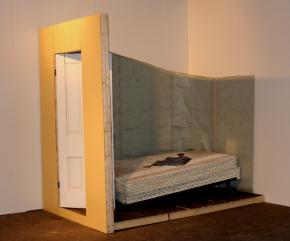The war women bring home
reviews an art exhibit that tells the stories of women who served in the military and the sexual violence they faced.
THE ART exhibit Overlooked/Looked Over at the National Veterans Art Museum in Chicago features the work of eight women veterans. The title is a riff on a classic Mae West one-liner: "I'd rather be looked over than overlooked."
For women, this is a central dichotomy--to have their voices and talents ignored because they're women, or to be objectified and viewed only as sex objects. In the art world, the work of female artists has been overlooked for decades. In the military, being "looked over" by male soldiers can have dangerous consequences.
During an emotional panel discussion at the opening of the show, three of the eight artists revealed that they were raped while serving in the military. There is an epidemic of sexual violence against women in uniform, and now it has an official name: Military sexual trauma (MST).
It's estimated that nearly one in three female soldiers have been sexually assaulted and that eight out of 10 women have been sexually harassed while in the military. A recent survey found that the number of reported violent sex crimes increased by 30 percent, and according to another study, women in the military are raped and assaulted at significantly higher rates than in civilian society.

Most instances of rape, however, are still not reported. Women soldiers fear retaliation, looking weak and being seen as disloyal if they report fellow soldiers, and they are often forced to work alongside the men who have raped them.
Studies have also demonstrated that MST is more damaging to women's mental health than being in a war zone, and contributes more strongly to developing post-traumatic stress disorder (PTSD) than combat-related stress. What is going on?
MILITARY CULTURE is shot through with misogyny. Many men still resent the mere presence of women in the military. Several of the artists in Overlooked/Looked Over said that they were routinely sexually harassed, leered at and called bitches, pussies and sluts. If the women refused sexual advances they were called "dykes."
Regina Vasquez, a Marine Corps veteran, said she felt like a "walking mattress." She was raped by two fellow Marines who threatened to kill her if she told anyone. Her piece called "Fatigues Clothesline" is part of a movement to stop MST and to provide a creative outlet to heal the trauma.
Clotheslines typically evoke nostalgia of warm memories of blue skies, tranquil sunny summer days, clothes blowing in the wind and selfless mothers taking care of the family's laundry. Not for Vasquez. She has pinned military battle fatigue clothing to a clothesline and has written her thoughts and feelings all over them.
The clothes are her canvas and a visual diary to help civilians see "what's under the uniform." It's hideous. Vasquez expresses her outrage on one camouflage jacket and writes: "WHAT THE FUCK!!!! 1 out of 3 women service members is sexually assaulted. Did it just happen to me?" Another piece states simply, "I joined to serve. I did not expect to get raped." Vasquez's work also depicts the horror of combat deaths that is shielded from the public eye.
She inscribes on a shirt: "I was in charge of finding the pieces and put them in body bags...They blew him up. He was my best friend." Walking through the clotheslines and reading Vasquez's words is a terrifying education in the brutal reality of war that is sanitized by the mainstream media's coverage of military conflicts.
Robynn Murray served in the army in Iraq. She said, "It feels so patriotic to be in Baghdad. But you realize it's crap." She is the subject of a short documentary called Poster Girl. Murray was raped in the military and was diagnosed with PTSD. She has created bustier-like body casts made from her upper torso. They express a mix of female sexuality, violation and the contradictions of war.
For Murray, her body is the battleground. The molded breastplate titled Healing is all black-and-white crumpled combat paper with a question that asks, "Is Iraq about money or freedom?" The body cast Baghdad consists of shellacked pieces of chopped-up white stars and stripes of red and blue: The American flag. The piece gives new meaning to "wrapping oneself in the flag," the widely hated and burned symbol of American empire in the Middle East.
Indoctrination is a piece composed of ripped-up pages of military manuals against a purple background with illustrations that teach soldiers how to salute correctly and tests their knowledge of weapons: "What are the rates of fire for the M2419?"
Erica Slone is a veteran of the Air Force and served in Iraq. She curated the show and has created a powerful installation titled Uncovering My Crime Scene. It consists of a white door, half a wall and a mattress. Slone was drugged into unconsciousness and raped in her room. She didn't report the crime because she's a lesbian and was serving under "don't ask, don't tell."
Slone wonders how her life might be different if she had come forward. For many, a mattress represents relaxation, sleep, a place of safety. Slone's mattress is the opposite--it's a violent crime scene. The mattress is stripped of sheets and part of the center is cut out exposing a dark hole of metal springs. The installation evokes the isolation and loneliness that many women who've been sexually assaulted feel. It reveals how objects that comfort can be transformed into objects of fear and painful memories.
Overlooked/Looked Over is a powerful and at times emotionally overwhelming exhibit that shows toll the savagery of the war takes on women soldiers. It also shows how art is a vehicle to repair the wounds of war and gives survivors of MST a voice to challenge the U.S. military that continues to victimize, silence and shame them.


